
Acquiring high-quality links is key to climbing the search engine rankings, and .gov backlinks are at the top of the wish list for search engine optimization (SEO) experts.
These .gov backlinks come from federal and local government agency websites, which are highly trusted and authoritative in the eyes of search engines and users.
Securing a .gov backlink is no easy feat, though. Government sites are selective about who they link to. This makes .gov backlinks rare and extremely valuable.
However, there is some debate about their impact among SEO professionals, owing to a statement from Google’s former head of Webspam:
Google doesn’t treat .gov or .edu domains any differently.
Despite Cutts’ comments, the consensus among SEO professionals is clear: the authority and trust that comes with .gov backlinks can significantly impact your SEO efforts.
While challenging, getting .gov backlinks is not impossible.
At Linkbuilder, we have almost a decade of experience behind us. In this article, we share practical strategies and insights to help you acquire government backlinks.
Why Are .gov Backlinks So Valuable?
The appeal of .gov backlinks lies in the authority of the domains themselves.
Federal and state government agencies and departments all use the .gov domain—it signifies a level of importance, reliability, and trust that few other domains can match.
Here’s what makes .gov backlinks so valuable:
🚀 High domain authority
Not just anyone can launch a .gov site—this domain is strictly reserved for federal and state government agencies.
The .gov domain signals to search engines and users alike that these websites are authoritative and trustworthy sources.
Here are some of the domain rating (DR) scores for government websites:
CDC.gov: 93
Footsafety.gov: 82
Newportbeachca.gov: 71
Noaa.gov: 91
When high-authority sites share links to your site, those backlinks act as powerful endorsements of your content's credibility and relevance—and this is one of the key factors that search engines consider when ranking your website in SERPs.
These endorsements are particularly powerful when they come from .gov websites, whose links carry more weight due to their inherent authority and trustworthiness.
A backlink from a .gov site like CDC.gov or Noaa.gov can have a massive impact on your SERP rankings.
🚀 Trustworthiness
When it comes to trust, few websites are as universally respected as those with the .gov domain. They are seen as credible and reliable sources of information by both users and search engines.
A .gov backlink serves as an endorsement of your site’s quality, which enhances your site’s credibility and, by extension, its search rankings.
🚀 Rarity
The challenge to secure a .gov backlink underscores its value.
These links are rare, not because of a scarcity of government websites, but due to the rigorous standards and processes involved in getting featured on one.
The rarity and difficulty of obtaining .gov backlinks make them the gold standard in the world of SEO.
🚀 Natural authority
Government websites don’t need to fight for their place in search rankings.
Instead, they naturally occupy top positions due to their inherent trust, authority, and relevance.
This natural authority is beneficial for SEO because:
The content is unique and often cannot be found elsewhere.
They have a vast network of inbound links due to their informational value.
Users and search engines trust the information provided by these sites.
If a government website links to your website, it passes on a high degree of link juice.
💡 What Is Link Juice?
Link juice is a term used to describe the value or authority that one webpage passes on to another through hyperlinks.
When a website links to another site, it shares some of its own site's authority with the linked site. This transferred value can improve the receiving site's visibility in SERPs.
The amount of link juice passed depends on several factors, including:
The linking site’s domain authority.
The relevance of the content.
The number of links on the linking page—if a page links out to many other websites, the link juice is divided among those links.
The 3 Types of .gov Backlinks
While all .gov backlinks carry authority, certain types can be more powerful than others. Let’s break down the three types:
🔷 Federal .gov sites
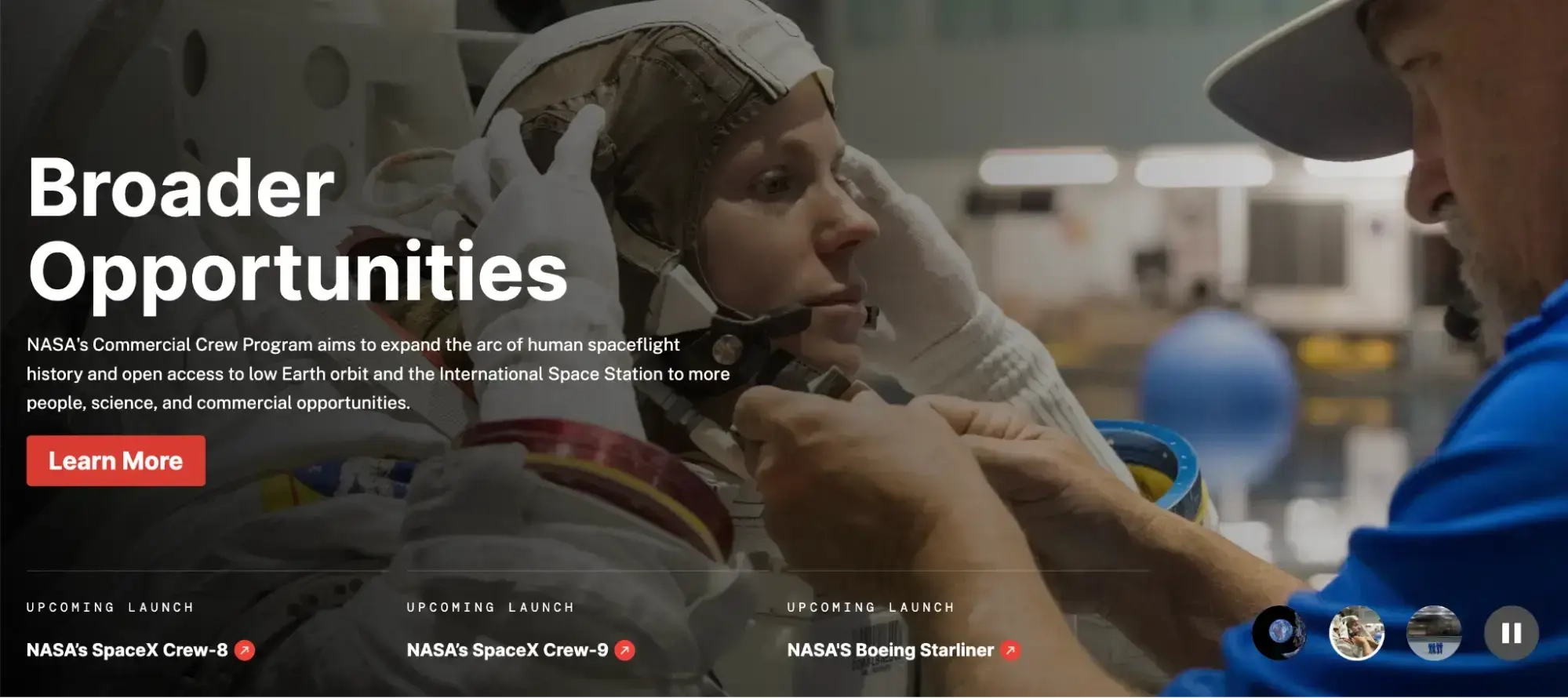
At the pinnacle are backlinks from federal .gov sites.
These .gov backlinks are the most powerful because they come from sites with the highest domain authority.
Agencies like the CDC or NASA are universally recognized, and a backlink from government sites like these is a strong endorsement.
However, securing these types of .gov backlinks is particularly challenging due to the high standards and strict regulations governing federal government websites.
Acquiring federal .gov backlinks takes a monumental effort, but the SEO payoff is worth it.
🔷 State .gov sites

Next in line are state .gov sites, like the above example of the state of California’s website.
These backlinks are slightly less valuable, not because of their inherent quality, but because state websites typically aren’t updated frequently.
Search engines favor sites with regularly updated content, and a lack of updates can lead to a perception that the site is less active.
This can potentially lessen the backlink's impact.
Nonetheless, state .gov backlinks are still highly regarded and can boost your site’s performance in SERPs.
🔷 Local .gov sites

On the more accessible end of the spectrum are local .gov sites, such as those belonging to city councils or local public libraries.
While they may be seen as less valuable by search engines in the context of global or national search queries, local .gov backlinks are powerful tools for local link building.
ℹ️ Local Linkbuilding
Local linkbuilding is a strategy that focuses on creating backlinks from websites within the same area as your business.
These can include local news sites, community blogs, and government websites for your city or county.
The goal is to increase your site's relevance for local search queries, which can lead to improved visibility in local search results.
For more information, have a look at our in-depth guide on local link building.
How to Find Government Websites Relevant to Your Niche
There are several effective strategies for finding .gov websites relevant to your niche for the purpose of linkbuilding.
Here's a breakdown of these methods:
🚀 The Google method
Using Google to find .gov sites relevant to your industry is efficient and straightforward.
Begin with the search query site:.gov to ensure only government websites appear in your results:
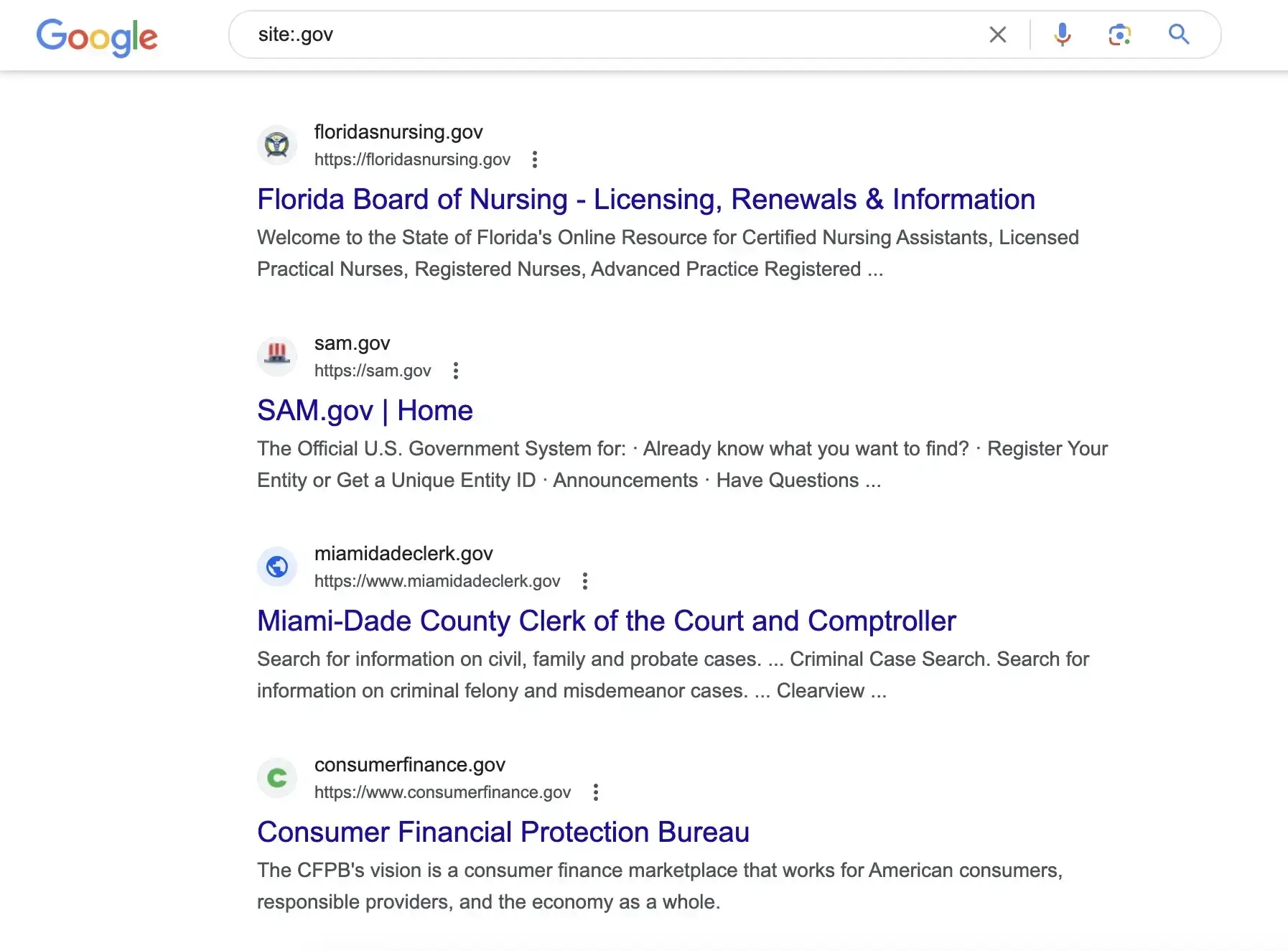
Then, refine your search by adding in your target keywords.
For instance, site:.gov "renewable energy" will return .gov pages related to the renewable energy sector:
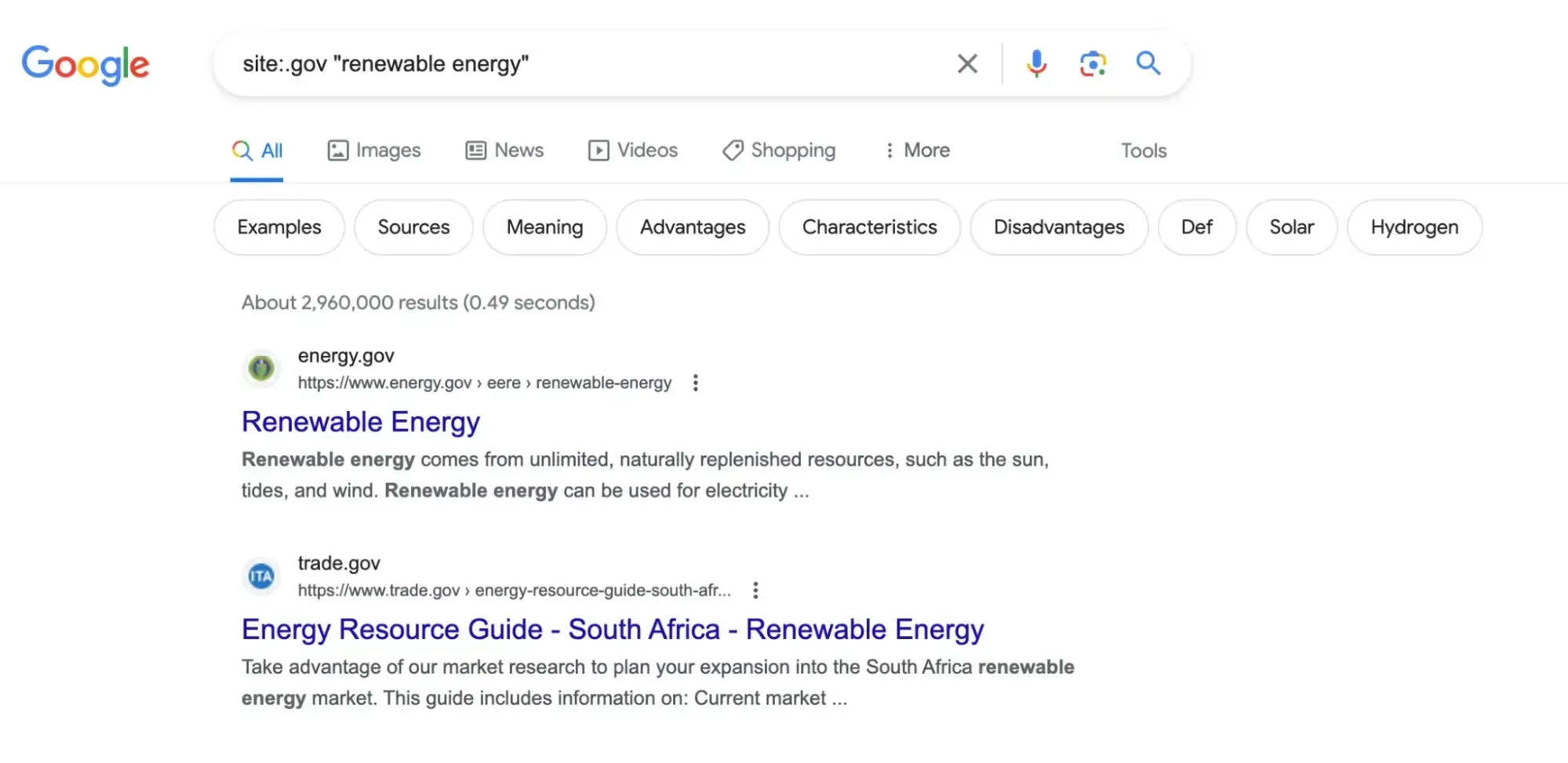
Ensure the pages you find are open to external resources and backlinking opportunities.
This could mean looking for resource pages, official blog posts, or public information sections that align with your industry.
🚀 Competitor analysis
Tools like Ahrefs can reveal which government sites have linked to content that is similar to yours.
If a .gov site has linked to one of your competitors, there's a chance they might also be interested in what you have to offer.
Take the example below.
If the South Carolina Election Commission links to your competitor, there's a chance they might link to your website, too—but you’ll need to develop high-quality, authoritative content that is more compelling than that of your competitor.
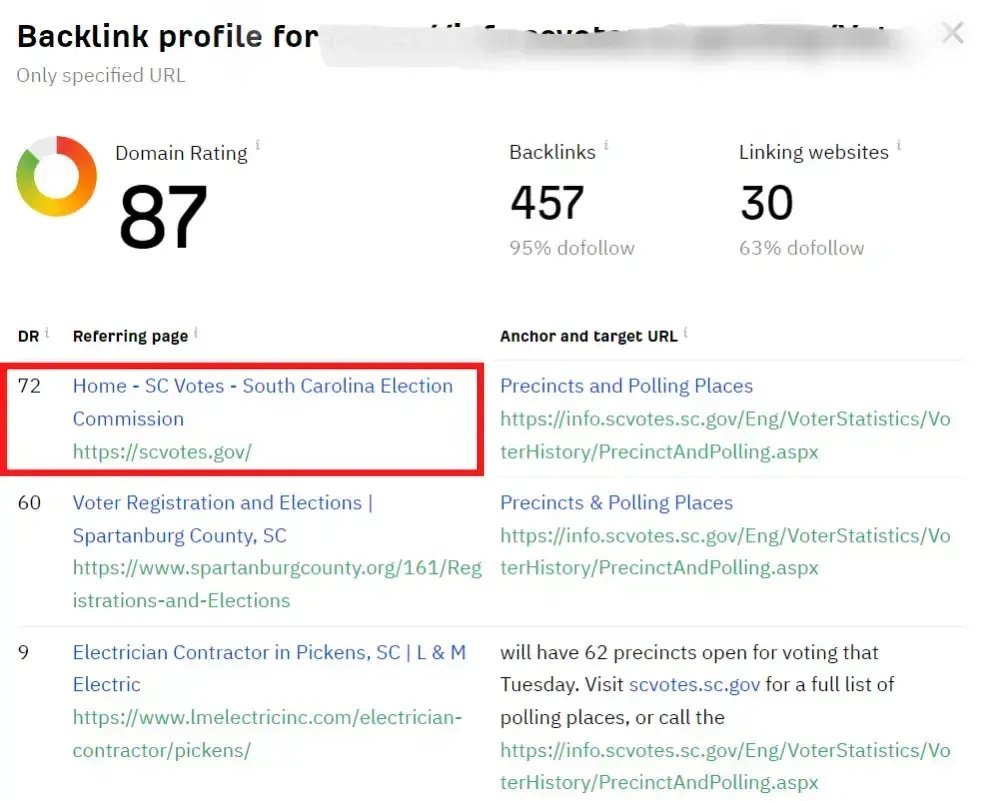
🚀 Government agency directories
Exploring directories of government agencies can be the most direct method to find .gov sites.
This method can be time-consuming as it often involves combing through extensive lists, but it can also lead to discovering niche sites directly related to your industry.
Here are some examples of government directories:
🚀 Use ChatGPT
Asking ChatGPT to list well-known government agencies or to help identify .gov websites within your niche can provide a starting point.
Although you will need to verify the accuracy of the government sites that ChatGPT suggests, it can quickly generate a list of potential government agencies to investigate further
7 Tried-and-Tested Strategies to Get .gov Backlinks
1. Find broken links on local government sites
Building .gov backlinks by identifying and replacing broken links on local government websites is a proactive approach that can achieve great SEO results.
Here’s how you can find broken .gov links on local government sites:
Find broken links: Use tools like Screaming Frog SEO Spider or Semrush Broken Link Checker to crawl local .gov websites for broken links. Also, look out for 404 errors or outdated content that no longer serve their audience.
Identify or create relevant content: Have content prepared that can serve as a replacement for the broken link. Your content should be high quality, relevant, and offer value to the site's audience.
Reach out: Once you've identified a broken link and have relevant content, reach out to the website's contact person. Present your content as a resource that can replace the broken link.
Be community-oriented: Emphasize how your content benefits the local community. Local government sites are more likely to link to resources that directly impact their constituents.
Follow-up: If you don’t receive a response, send a follow-up email. However, always be courteous and professional as government staff likely have many responsibilities and limited resources.
Monitor: Once you've established a link on a local .gov site, keep an eye out for new opportunities to fix broken links. The more you can help a site maintain its content, the more you will be seen as a trusted resource.
💡Why You Should Focus on Local Government Agencies
✔ Accessibility: Local government sites are generally more accessible when it comes to communication. The staff responsible for maintaining these websites may be more receptive to direct outreach compared to federal websites.
✔ Local community: Demonstrating a direct impact on the community served by a local government website can make the proposition of fixing a broken link more compelling. Federal agencies usually don’t have the same level of interest in local content, so don’t reach out to them unless your content is relevant to the federal government in question.
✔ Relevance: For local businesses that serve specific areas, local .gov backlinks can improve local search engine rankings and drive traffic more effectively than a link from a federal site.
2. Get listed on .gov resource pages
Getting featured on a government website’s resource page provides a boost in credibility and visibility.
However, being featured on government sites’ resource pages requires a strategic and methodical approach.
Take this example of the collections page on the National Institute of Allergy and Infectious Diseases (NIAID) community-driven 3D modeling website:
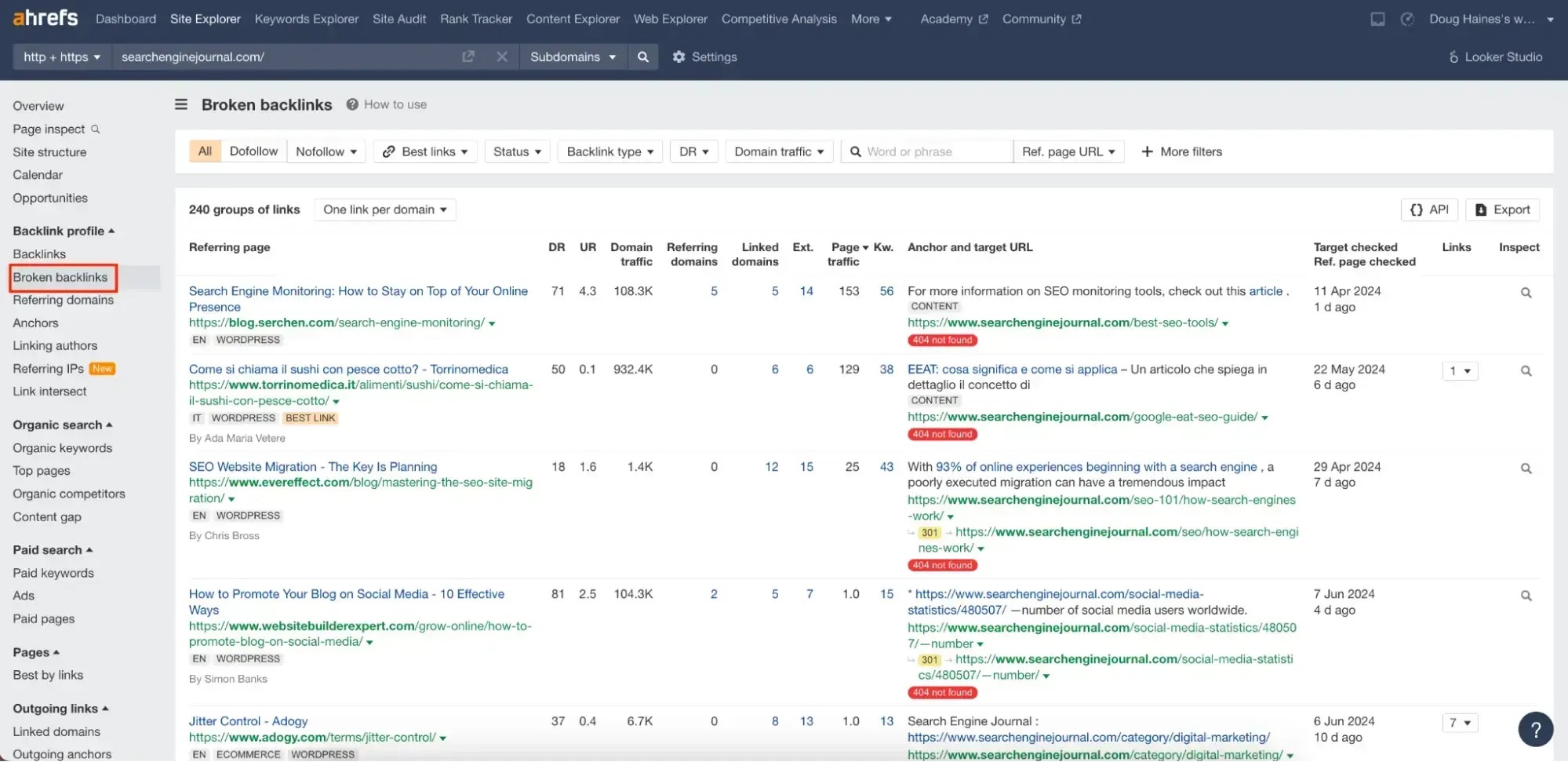
This page showcases a variety of 3D models from different partners, such as Jump Simulation, EyeWire, the Bioimaging Hub at Cardiff University, and the Veterans Health Administration’s Office of Advanced Manufacturing.
To get your collection featured on a government site like this, your content must align with the agency's mission and offer value to its audience. For NIAID, this could involve contributions to medical research, public health information, or innovative health technology.
Next, you'll likely need to go through a vetting process. This is where having credible, peer-reviewed research or recognized expertise in your field can make a difference.
Patience and perseverance are key. The process of acquiring a .gov backlink that features on a government resource page can be slow, and there may be hoops to jump through.
Still, the result—a powerful .gov backlink—can have a substantial impact on your SEO efforts by driving authoritative, relevant traffic to your site and enhancing your organization's credibility.
3. Partner with a government agency
Building partnerships with government agencies for .gov backlinks is a strategic move that can significantly impact your SEO.
However, this comes with its own set of challenges. Finding a direct and relevant connection between what your website offers and the objectives of a government agency might not always be straightforward.
Government entities are primarily concerned with serving the public interest, so your content or services need to align with their mission to be considered for a partnership.
This press release about a property acquisition in Proctor Valley is an outstanding example of a nonprofit organization partnering with government agencies:

The Nature Conservancy collaborated with government agencies such as the U.S. Fish and Wildlife Service and the California Department of Fish and Wildlife to conserve a biodiverse area.
The press release was originally published on The Nature Conservancy’s website, and was then shared by the U.S. Fish and Wildlife Service website.
This earned The Nature Conservancy a .gov backlink, along with a chance to reach a wider audience. This audience, which may include other conservationists and researchers, can also lead to backlinks and organic traffic from other sources that reference the project.
4. Conduct a study in your niche
Conducting a study within your niche holds massive potential for earning .gov backlinks.
This approach is most effective for industries that naturally align with the interests of government agencies—it typically involves fields such as healthcare, education, environmental science, and public policy.
Not all industries will find this approach feasible. The investment needed in research, its scope, and complex data requirements mean that some sectors might find it challenging to produce content that would engage government websites.
For those industries, other strategies for building .gov backlinks may be more cost-effective.
Here’s an example of a study that was able to obtain a .gov backlink from the Centers for Disease Control and Prevention (CDC):

This is why it's so effective:
✔ Relevant: The study provides insights into the use of telemedicine across different medical specialties. By presenting new, niche-specific data, it naturally aligns with the CDC’s content.
✔ Public interest: Telemedicine has gained public and governmental interest, especially considering the shift toward digital healthcare. A study that sheds light on this trend carries the potential for high engagement and sharing across government websites.
✔ Utility: This study provides practical utility to policymakers, healthcare providers, and educators within the .gov domain. Its findings can influence policy, inform healthcare practices, and serve educational purposes.
In addition, one of the authors of the study, Kelly L. Myrick, Ph.D., was interviewed by the CDC after the study was published:
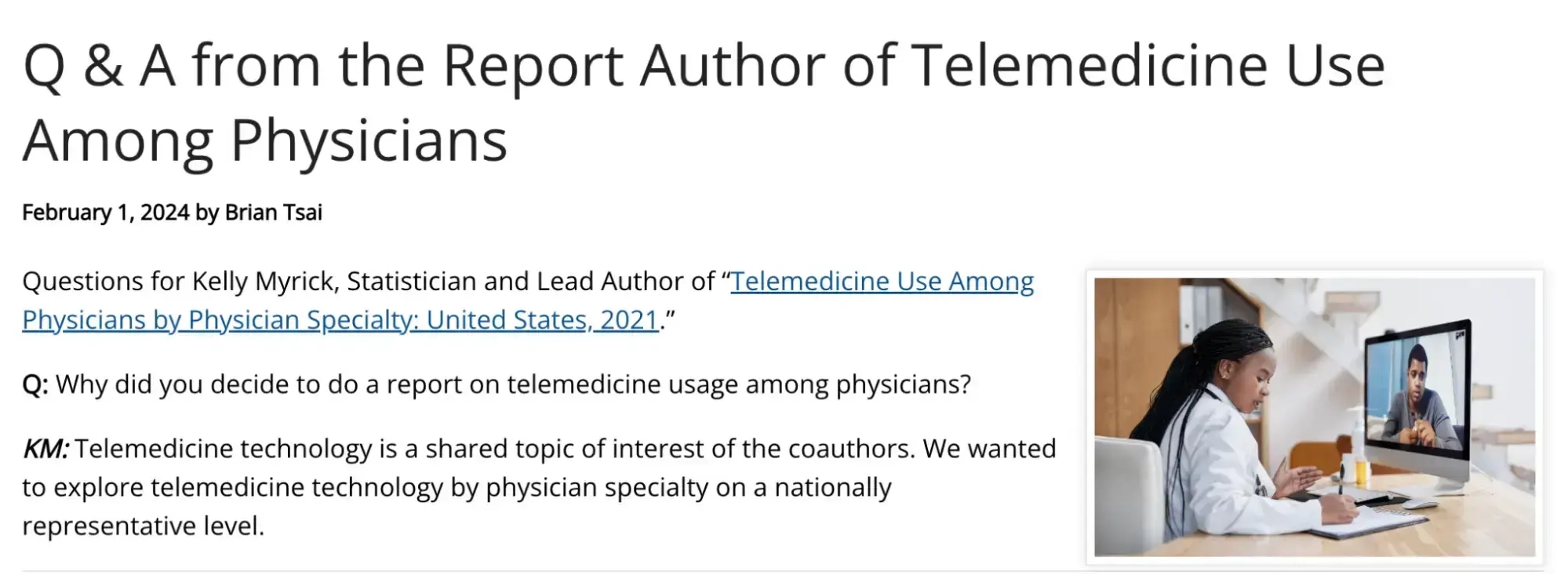
From an SEO perspective, this interaction is a goldmine.
It’s an excellent example of how conducting high-quality research can earn valuable .gov backlinks and lead to opportunities like interviews with government agencies.
5. Write about a government agency
By creating content that showcases the work of a government agency, you not only provide them with valuable publicity, but also set the stage for potential .gov backlinks to your site.
Here’s how to get started:
Identify relevant agencies: Pinpoint government agencies that align with your niche. If you're in environmental consulting, for example, you might consider writing about the Environmental Protection Agency (EPA).
Conduct research: Immerse yourself in understanding the agency's initiatives, recent studies, or community programs. The goal is to find a compelling angle that you can expand upon in your article.
Create content: Write a piece that informs and engages the reader. Whether it's a deep dive into policy impacts or a feature on an agency’s community project, ensure your content is well-researched and valuable.
Outreach: Once your content has been published, reach out to the government site. Craft a personalized message that explains how your piece positively highlights their work and offers them additional exposure.
💡 3 Tips to Boost Your Chance of Success
Include quotes from industry experts or community leaders to add credibility to your article.
Make sure that your content casts the government agency in a positive light. Government departments are more likely to link to content that showcases their successes.
While your primary goal is to get a .gov backlink, consider the value that you could offer in return. This could be additional exposure through your own networks or featuring their content in future pieces.
6. Write about a politician
Similar to writing about a government agency, writing about a politician can also pave the way for acquiring valuable .gov backlinks.
Choose a politician whose initiatives or policies intersect with your niche and ensure that the content you create around them remains relevant and appealing to your audience. Your content should be neutral, respectful, and unbiased so it can appeal to those beyond your core audience.
Of course, you should aim to highlight the positive aspects of the politician’s work. Whether it's a successful policy, community engagement, or support for a cause, presenting these highlights in a favorable light makes it more likely that they’ll share your content.
After having published your content, reach out directly to the politician's office or media team and ask whether they would be willing to share it.
Writing about a politician with the intent of acquiring a .gov backlink is a subtle art. It involves creating high-quality, unbiased content that not only serves your audience’s interests, but also aligns with the politician's public image and goals.
7. Write a guest post for government blogs
Writing a guest post for government blogs can be an effective method to secure .gov backlinks.
However, it's important to note that this avenue is considerably more challenging than obtaining guest posts on other types of sites.
Here’s how you can approach securing a guest post on a government site:
Find the right opportunities
Use Google search to find guest posting opportunities that could help you build .gov backlinks. Use queries such as:
site:.gov “write for us”
site:.gov “contribute”
site:.gov inurl:write
site:.gov inurl:contribute
These queries can help you find government blogs that are actively seeking contributors.
Look for pages that provide submission guidelines for guest writers, often titled "Write for Us" or "Contribute."
Prepare your pitch
Before pitching your guest post, ensure you're well-versed in the content and style of the government blog. Understand their audience and the types of content they typically publish.
Your content idea should be compelling, offer a fresh perspective, and align with the blog’s themes and objectives. It should also provide clear value to the agency's audience.
Craft a professional proposal
Your pitch should be professional and concise. Introduce yourself, explain why you’re qualified to write the piece, outline your proposed article, and how it benefits their readership.
Government sites will prefer content from recognized experts in the field. Include your credentials, experience, and any previous publications that showcase your expertise.
Remember, the review process can take time, so be patient after you’ve submitted your pitch. Government sites may not respond as quickly as private sector blogs.
Submit your post
When you're ready to submit, ensure your proposal strictly adheres to any content, formatting, or submission guidelines provided by the government site.
Deviating from these guidelines can result in automatic rejection.
After your post has been published, keep engaging with the government agency by commenting on their posts and sharing their content.
Guest posts on government sites aren’t just about getting a .gov backlink—they’re also about building credibility, fostering relationships, and establishing yourself as an authority in your field. Creating valuable, original content is the only way to achieve this.
Start Securing .gov Backlinks with Linkbuilder
Earning .gov backlinks can be complex and time-consuming—it requires a nuanced approach, subject matter expertise, and strategic outreach.
But the investment is worth it because building .gov links to your website significantly boosts your SEO, enhances your credibility, and improves your overall online visibility.
With persistence and the right strategy, securing a .gov backlink becomes a realistic goal—and partnering with professionals who have an in-depth understanding of the process can streamline your efforts.
At LinkBuilder, we specialize in developing bespoke link-building strategies that align with the stringent criteria of .gov sites. If you're ready to take your website to the next level, contact us today.


